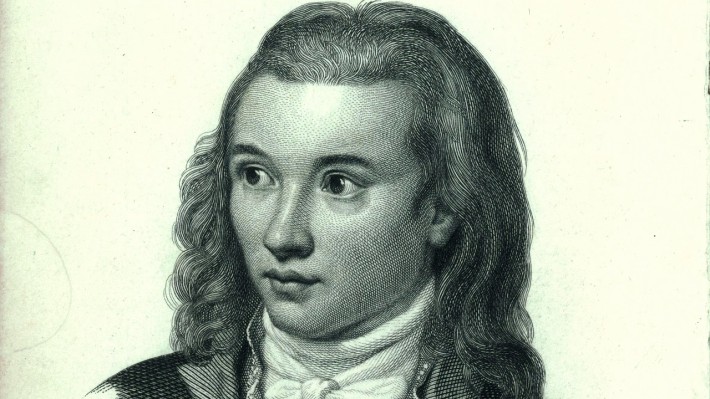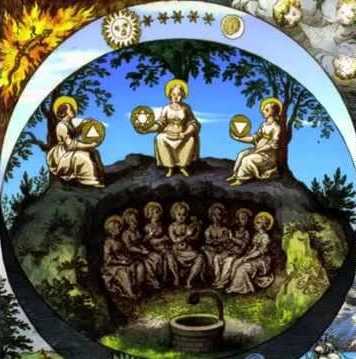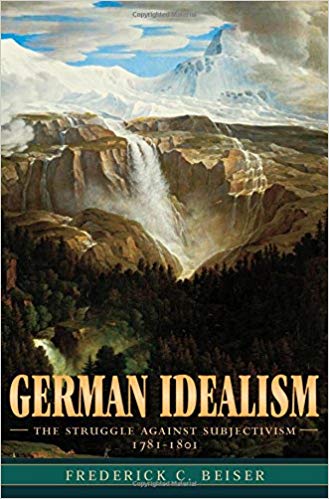
“Philosophy is my Lieblingsstudium, the soul of my life and the key to my most innermost self”
Novalis (1772-1801), born Friedrich von Hardenburg, was a poet, writer, scientist and philosopher.
A pioneer of the Early Romantic movement in Germany, he helped to revive a deeply felt sense of belonging to nature, the expression of which had been stifled for centuries by the dogmas of Christianity and then modernity.
Although more often remembered for his poetry, Novalis wrote in a letter in 1796: “Philosophy is my Lieblingsstudium, the soul of my life and the key to my most innermost self”. (1)
This philosophy was holistic and organic, aiming to overcome the dualist separation of the mental and the physical which dominated not just Christian but also scientific thinking at the time.
Against the mechanical physics of Descartes, Novalis developed a more dynamic concept of nature, which regarded matter as living force.

Frederick C. Beiser writes: “Like Schelling, Novalis revived the concept of the world soul, seeing all of nature as a single organism. Each individual living thing is comprehensible by how it depends on all other living things; and the organic system of all individual living things forms another individual living thing, which is the world soul”. (2)
Novalis occasionally used the term “magical idealism” to describe his philosophy and this has sometimes been misinterpreted.
Beiser explains that Novalis did indeed have “some sympathy with the hermetic and cabalistic traditions” (3) and that some of these ideas feature in his magical idealism.
But he adds: “All too often in Novalis the mystical and magical is simply a poetic or religious formulation for philosophical or scientific doctrines.
“Nowhere is this more apparent than in Novalis’ fascination with one of the central ideas of the cabalistic tradition: the sympathy of the sign with the signified, the doctrine of the signatura rerum, according to which everything in nature is a secret language.
 “This idea was central to Novalis’ whole conception of magic. He became so excited by it because it seemed to rest on a profound scientific truth: that the external appearances of nature reveal an underlying chemical structure”. (4)
“This idea was central to Novalis’ whole conception of magic. He became so excited by it because it seemed to rest on a profound scientific truth: that the external appearances of nature reveal an underlying chemical structure”. (4)
His approach was a metaphysical one and metaphysics, while dismissed as “mysticism” by the modern mindset, is in fact a hyperrational intellectual tradition with roots in Ancient Greece, Persia and India.
Novalis was particularly influenced by the philosopher Plotinus and his pantheistic metaphysics of a living universe.
Writes Beiser: “In the autumn of 1798 Novalis made a momentous discovery: Plotinus! Plato and Hemsterhuis had been his favourite authors since he began his study of philosophy, but he became acquainted with the ideas of the great neo-Platonist only much later by reading Tiedermann’s Geschichte der Philosophie.
“Novalis found that Plotinus’ ideas were exactly what he had been looking for in his attempt to fuse idealism and realism, and that no other philosopher suited him so well.
“So pleased was Novalis with his find that he later told Caroline Schlegel that Plotinus was the first philosopher to enter the sacred temple, and that no one after him had penetrated so far inside it”. (5)
Beiser lists Novalis alongside Friedrich Hölderlin, Friedrich Schlegel, Friedrich Schelling and Georg Hegel as absolute idealists who postulated “the existence of the absolute and the infinite reality of nature”.
 He adds: “Rather than making nature the product of the transcendental subject, the absolute idealists did the very opposite, deriving the transcendental subject from its place within nature. The rationality of the Kantian-Fichtean subject now became nothing more than the highest manifestation and realization of the powers of nature”. (6)
He adds: “Rather than making nature the product of the transcendental subject, the absolute idealists did the very opposite, deriving the transcendental subject from its place within nature. The rationality of the Kantian-Fichtean subject now became nothing more than the highest manifestation and realization of the powers of nature”. (6)
Novalis and the others regarded the universe, or absolute, as expressing itself to its fullest extent only through the consciousness of what appeared to be separate individuals. The individual’s awareness of the universe was the self-knowledge of the universe, by means of the individual.
Says Beiser: “The romantics regard the absolute first and foremost as an organic whole. Like any organism, the whole determines the identity of each of its parts, and each part also determines the identity of the whole”. (7)
Although he died of TB at the age of 28, Novalis inspired generations of German-speakers to come, including Hermann Hesse.
In his youth Hesse was “especially engaged by Novalis”, says biographer Ralph Freedman. “He wrote about him so effusively that Marie Hesse began to fear that the poet’s ‘Catholic temperament’ might subvert her son, and Hermann had to convince her that despite his medieval and mystical themes, Novalis was a Protestant”. (8)
Novalis was also a major influence on the anarchist Gustav Landauer and other members of the movement that Michael Löwy calls “anti-capitalist Romanticism”.
For instance, philosopher and historian Hans Kohn later recalled a reawakened interest in Romanticism at the start of the 20th century and cited Novalis’s work as among the “classics” most read by youngsters of his generation.
He added that, for them, the mechanised scientific outlook of industrial capitalism seemed “cold, lifeless and sterile” and they wanted to reach down to “the obscure and primordial sources (Urquellen) of being”. (9)
The Situationist philosopher Guy Debord was also a great admirer of Novalis.

1.Frederick. C. Beiser, German Idealism: The Struggle Against Subjectivism 1781-1801 (Cambridge, Massachusetts: Harvard University Press, 2008), p. 407.
2. Beiser, p. 428.
3. Beiser, p. 425.
4. Ibid.
5. Beiser, p. 420.
6. Beiser, pp. 3-4.
7. Beiser, p. 356.
8. Ralph Freedman, Hermann Hesse: Pilgrim of Crisis (London: Abacus, 1981), p. 83.
9. Hanz Kohn, Martin Buber, 1930, pp. 60-65, cit. Michael Löwy, Rédemption et utopie: le judaïsme libertaire en Europe centrale (Paris: Éditions du Sandre, 2009) p. 200.
